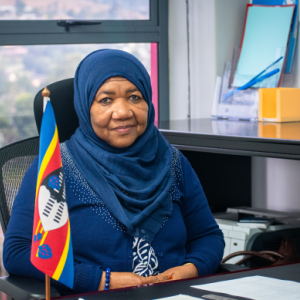Principal Secretary,
Chairperson of Eswatini Association of the Visually Impaired Person (ESAVIP),
Secretary of ESAVIP,
Chairperson of FODSWA,
Partners,
Distinguished guests,
Ladies and gentlemen,
A very good morning to you all.
It is an honour to be with you today, on behalf of the United Nations Family in Eswatini, to celebrate World Sight Day and International White Cane Day. These significant occasions celebrate the extraordinary courage and achievements of persons living with visual impairment and indeed, the independence which the white cane provides to such individuals.
This year’s theme for World Sight Day; ‘Love Your Eyes,’ is a reminder to us all of the significance of eye health. Globally, 2.2 billion people live with visual impairment, whilst one (1) billion people live with a visual impairment that is either preventable or yet to be addressed. Unoperated cataract and uncorrected refractive error are the leading causes of visual impairment, with persons over the age of 50 at particular risk: both of which are either preventable or repairable conditions.
As the COVID-19 pandemic continues to devastate the world, and expose immense inequalities, our brothers and sisters with visual impairment are at great risk of being left behind. Persons with disabilities are already less likely to access education and healthcare, as well as economic opportunities and those of leadership within their communities: access which has weakened during the pandemic, and in turn, the recent civil unrest in the Kingdom of Eswatini.
In our beautiful nation, an estimated 12,000 people live with visual impairment, according to the World Health Organisation (WHO), of which 6,000 cases are resultant from cataracts.
It is therefore essential that we stand in solidarity with our brothers and sisters living with visual impairment – those who do not have the same privilege to see the world as many others do.
Today, we celebrate the incredible bravery, resilience and determination of persons living with blindness and visual impairment, who live and work independently, lead their families and communities, and make a difference in a world that is sighted. We honour and deeply admire your contributions to Eswatini and the world.
Aided by the white cane: a tool which has historically become a symbol of freedom and independence for persons living with blindness, we celebrate today the extraordinary achievements of our brothers and sisters who rely on the white cane. It is therefore an honour, on behalf of the Untied Nations Family in Eswatini, that I present to you 400 white canes. It is our every hope that these white canes will empower EmaSwati living with visual impairment and blindness, to live independent lives and continue to make an impact in our beautiful nation.
The United Nations continues to stand in solidarity with all persons, everywhere, who live with blindness and visual impairment. Through the commitment by UN Member States to Agenda 2030, countries are striving to ensure that by 2030, there is a 40 percent increase in effective coverage of refractive errors, as well as a 30 percent increase in quality coverage of cataract coverage worldwide.
The UN in Eswatini, through Agenda 2030 and the United Nations Sustainable Development Cooperation Framework (UNSDCF) 2021-2025, is dedicated to enabling a “just, prosperous and resilient Eswatini where nobody is left behind”. In collaboration with the Deputy Prime Minister’s Office’s Disability Unit, the UN is working to enable persons living with disabilities to thrive and live independent lives.
However, an urgent, renewed commitment, focus and dedication of resources are required to ensure that our brothers and sisters living with visual impairment and blindness prosper.
I am continuously inspired by the persons with blindness and visual impairment, whom I have the privilege of meeting. Today, I am moved by the incredible women and men present here, at Sigwe Inkhundla, who humbly make a difference in the lives of their community members. Your everyday courage, bravery and determination, match those of well-known persons with visual impairment and blindness such as musician, Stevie Wonder, and the Paralympic blind swimmer, Trischa Zorn, who has won 55 medals at the Paralympic Games and indeed, is the most decorated Paralympian of all time.
In the great words of Francis of Assisi: “Start by doing what is necessary; then do what is possible; and suddenly, you are doing the impossible.” Today, might we ambitiously renew our commitment to empowering persons with disabilities, including those living with visual impairment and blindness, to achieve what feels to be the impossible.
Thank you.



